© 2024 M. José Sánchez
© 2024 Urantia Association of Spain
¶ Gratitude: the way of Jesus
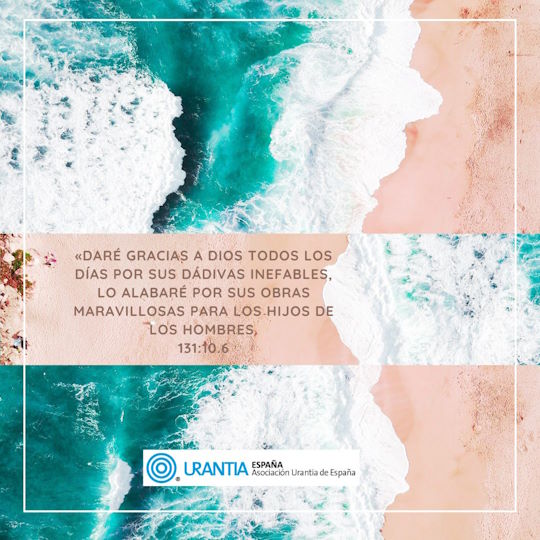
It is very possible that today you were able to eat. That you enjoy a roof, clothing, access to medicine. It is possible that you have people in your life who love you and whom you love. Maybe you have faith, which helps you in many moments of life.
Problems? There will surely be some too. Fears? Nostalgias? There will be some. Wounds? More than one, because we don’t live in a bubble.
That is, you are alive.
One of the great challenges of consumer society is to recognize that much of what we have is a privilege, to discover the enormous blessing of many of the things we can enjoy.
Today we talk about rights, we demand them. We aspire to so much and ask for so much that we can lose awareness of how lucky we are. There are so many things that could have been different in our lives… and yet, someone has put tenderness, trust, opportunities, forgiveness on our horizon.
We protest because it is our right and our duty, and it is not about being docile and gregarious flocks. So we protest when politicians, friends, teachers, etc. fail us. There are always reasons to protest, because there are always gaps and deficiencies. In all areas there is room for some protest.
But it is also necessary to be able to dedicate some time to enjoying what there is, what we already have, what is part of our life. To not live solely guided by the next desire, the next battle or the latest dissatisfaction. To let ourselves be guided, also, by the gratitude and joy of what we have already received.
“I will every day thank God for his unspeakable gifts; I will praise him for his wonderful works to the children of men. To me he is the Almighty, the Creator, the Power, and the Mercy, but best of all, he is my spirit Father, and as his earth child I am sometime going forth to see him. And my tutor has said that by searching for him I shall become like him. By faith in God I have attained peace with him. This new religion of ours is very full of joy, and it generates an enduring happiness. I am confident that I shall be faithful even to death, and that I will surely receive the crown of eternal life. (UB 131:10.6)
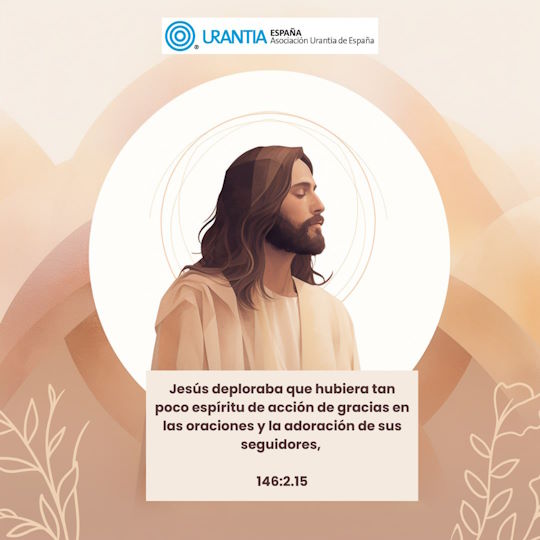
And what does it mean to love God? God is not loved in the same way that people whom one can see, hear, and touch are loved. For God is not a person in the sense that we use this word. God is the Unknown. The totally Other. God is above such expressions as he or she, person, or thing.
When we say that the audience fills the room and that the singer’s voice also fills the room, we are using the same word to refer to two totally different realities. When we say that we love God with all our heart and that we love our friend with all our heart, we are also using the same words to express two totally different realities. Because the singer’s voice does not really fill the room, and we cannot really love God in the ordinary sense of the word.
To love God with all your heart means to say an unconditional “yes” to life and to everything that life brings with it; to accept without reservation everything that God has arranged for your own life; to have the attitude that Jesus had when he said: “Not my will, but yours, be done.” To love God with all your heart means to make the famous words of Dag Hammarskjold your own:
“For everything that has been, thank you. For everything that will be, yes.”
Gratitude is essential in our lives. Jesus was very clear about it:
- Jesus warned his followers against thinking that their prayers would be rendered more efficacious by ornate repetitions, eloquent phraseology, fasting, penance, or sacrifices. But he did exhort his believers to employ prayer as a means of leading up through thanksgiving to true worship. Jesus deplored that so little of the spirit of thanksgiving was to be found in the prayers and worship of his followers. He quoted from the Scriptures on this occasion, saying: “It is a good thing to give thanks to the Lord and to sing praises to the name of the Most High, to acknowledge his loving-kindness every morning and his faithfulness every night, for God has made me glad through his work. In everything I will give thanks according to the will of God.” (UB 146:2.15)
Perhaps the first and most immediate thing we could do would be to begin by thanking God our Father for life. This is the first gift we have. A life full of possibilities opens up when we open our eyes to life on Earth. There will also be storms, but, above all, it will be a story in which we can build, dream, love, learn, make mistakes…
We could also give thanks to those people who have left a mark on our personal history. Starting with our parents, who surely did the best they could in their circumstances. Thank you for your time, your dedication, your attempt to give us the best, your love.
And we could continue with family and friends, other people who have crossed our path. We take it for granted that they are there and we end up neglecting to appreciate them. How can we not be thankful every day for the gift they are?
And today? We can also be grateful for those who are here today. So many names that populate our days. So many people who show us facets of ourselves. It’s curious how much time can be dedicated to criticism, much more than the time we dedicate to enjoying the capabilities, talents and contributions of others. However, personal ties are our greatest wealth.
Jesus prayed thus as he stood at the water’s edge: “Father, I thank you for these little ones who already believe in spite of their doubts. For them I have set myself apart to do your will. Let them now learn to be one as we are one.” 137:6.6
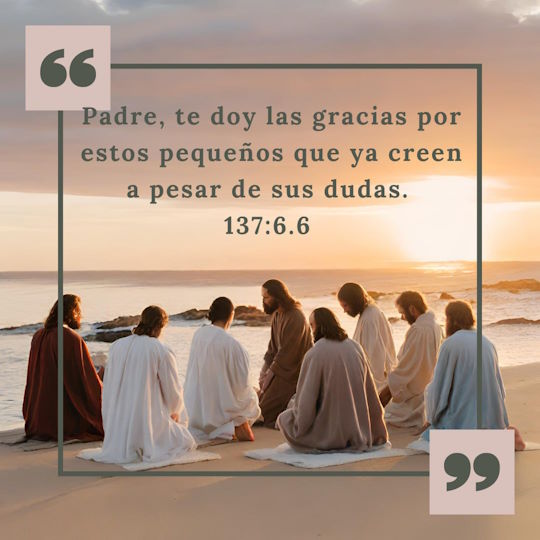
In a world so battered, where for so many people to live is to survive, many of our lives are simply wonderful. This should imply a deep and perhaps indefinite gratitude; a basic gratitude: that of someone who settles into a serene acceptance of existence, of the life that permeates us. A life cared for and gifted by our common progenitor, by the source of everything, by the infinite Father of his infinite sons and daughters.
And he continued saying: “Do not worry too much about your daily needs; do not be anxious about the problems of your earthly existence. In all these things, present your needs to your Father in heaven through prayer and supplication in a spirit of sincere gratitude.” UB 146:2.16
It is about being present in our lives, responding, spreading and sharing. Spreading the reasons for joy. Sharing the opportunities. Multiplying the fruits. Responding to words, gestures, hugs, with new words, gestures and hugs. Sharing the laughter and the reasons that we find day by day. And being grateful, always.
Jesus took the loaves in his hands, and after giving thanks, he broke the bread and gave it to his apostles, who passed it to their companions, who in turn took it to the crowd. UB 152:2.9
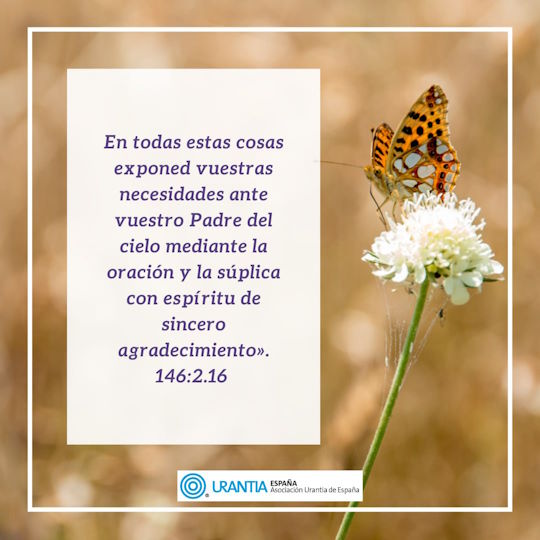
There is a beautiful story in The Urantia Book (and in the gospels) that we can bring here, because it makes us reflect on gratitude. It is the narration of the events that occurred in Amatus, a city bordering Samaria, a place where “a group of ten lepers had temporarily settled near that place. Nine of them were Jews and one was a Samaritan.” UB 166:2.1
Let’s see what happened.
The ten lepers had gathered outside the city, where they hoped to attract his attention and ask him to heal them. When they saw Jesus arriving, they did not dare to approach him and shouted to him from a distance: “Master, have mercy on us; cleanse us from our suffering. Heal us as you have healed others.”
Jesus had just explained to the twelve why the Gentiles of Perea and the less orthodox Jews were more willing to believe the gospel preached by the seventy than the more orthodox and tradition-bound Jews of Judea. He had also reminded them that their message had been better received by the Galileans and even the Samaritans, but the twelve apostles were still not willing to look favorably on the Samaritans whom they had despised for so long.
That is why when Simon Zelotes saw that there was a Samaritan among the lepers, he tried to incite the Master to pass by the city without wasting a minute in greeting them. But Jesus said to Simon: “What if the Samaritan loves God as much as the Jews? Are we going to judge our fellow men? Who knows? If we heal these ten men, the Samaritan may turn out to be even more grateful than the Jews. Are you so sure of your opinions, Simon?” Simon replied: “If you cleanse them, you will soon know.” And Jesus answered: “That will be so, Simon, and you will soon know the truth about the gratitude of men and the merciful love of God.”
Jesus came to the lepers and said to them: “If you want to be healed, go and show yourself immediately to the priests as the law of Moses commands.” And as they went, they were cleansed. The Samaritan, seeing himself healed, turned around and went in search of Jesus, glorifying God in a loud voice, and when he had found the Master, he fell to his knees at his feet and thanked him. The other nine, the Jews, also realized that they had been healed, and although they were also grateful, they continued on their way to show themselves to the priests.
While the Samaritan remained kneeling at the feet of Jesus, the Master looked at the twelve, especially at Simon Zelotes, and said: “Were not ten cleansed? Where are the other nine, the Jews? Not one has returned to give glory to God except this foreigner.” Then he said to the Samaritan: “Get up and go; your faith has healed you.”
Jesus looked back at his apostles as the stranger walked away, and all the apostles looked at Jesus except Simon Zelotes, who lowered his eyes. None of the twelve said a word. Nor did Jesus speak; there was no need for him to do so.
Jesus ordered the twelve not to say anything about the healing of the lepers, and as they entered Amathus he commented: “You see how the children of the house, even though they do not obey the will of their Father, take their blessings for granted and do not see the need to give thanks when the Father grants them healing. On the other hand, the foreigners are filled with admiration when they receive gifts from the master of the house and feel obliged to give thanks in recognition of the good things that have been granted to them.” UB 166:2
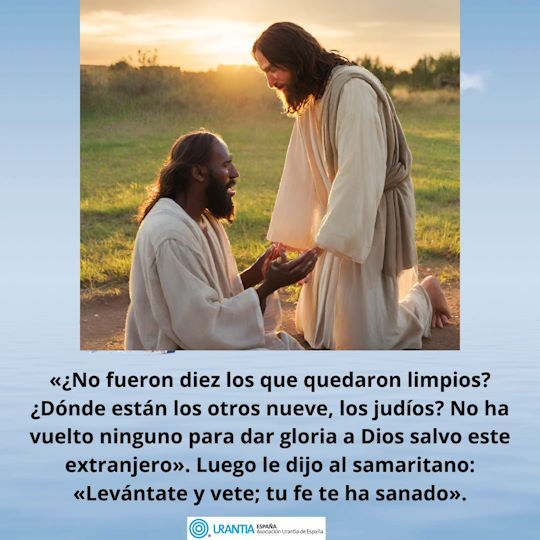
Gratitude. Always and everywhere.
Of the thousands of people Jesus ministered to recorded in the gospels, there were relatively few instances of people thanking him. The Samaritan leper was the only one of the ten lepers who were healed who returned to thank him. We just read that.
In fact, most of the people who benefited from Jesus’ teaching and wonderful miracles walked away from Him without thanking Him. Yes, they were amazed and excited about praising God, or they told other people about what Jesus did, but they did not go to Jesus to thank Him personally.
Jesus always lived grateful to God. Jesus thanks God for how the Father watches over all of his creation, even the little sparrows that are considered of little value and the wild flowers that were never seen by people (Matthew 6:26-30).
Let us learn to be grateful as our Master was, here on Earth.
Grateful for the laughter and the tears. The calm and the storm. The words and the silence.
Grateful to be able to offer you, once again, our new issue of the Luz y Vida Newsletter.
Grateful for the collaborations, work and suggestions.
Grateful to be able to promote, in this simple and tiny way, goodness, truth and beauty in our blue world.
Therefore, don’t miss the very interesting works and proposals for this month of April:
We propose four works from our website:
- The journey that follows physical death (Bill Sadler)
- The Urantia Book: why, how and what (Olga López)
- Teamwork (Chris M. Ragelty)
- A cry for hope (Eduardo Altuzarra)
We continue with the collaborations of Eduardo Altuzarra in the Chronicle of the life of Jesus (paper 154) and the Children’s Guide (Jesus takes Santiago to Jerusalem).
And we added all these contents:
- Other books on spiritual growth: Ami, the child of the stars (Enrique Barrios)
- Recommended audio: Holy Week and other similar ones, by L. Coll (Radio Urantia’s “Light and Life” space)
- Navigating through life: The world
- My favorite paragraph: Charles Perrotta
- Urantian questionnaire: Ana Eguren
- The Madrid Study Group turns 20 years old
- New courses from the Urantia Book International School (UBIS)
- UBIS “In Focus” presentation series
- April Urantia Talk by Francisco Santos, April 19, “The Seraphic Planetary Government.”
Thank you for being there, on the other side of the screen, dear reader.
Happy reading.
¶ References
- Index of the magazine “Luz y Vida” of the Association of Spain
- This article from the magazine “Luz y Vida Online”